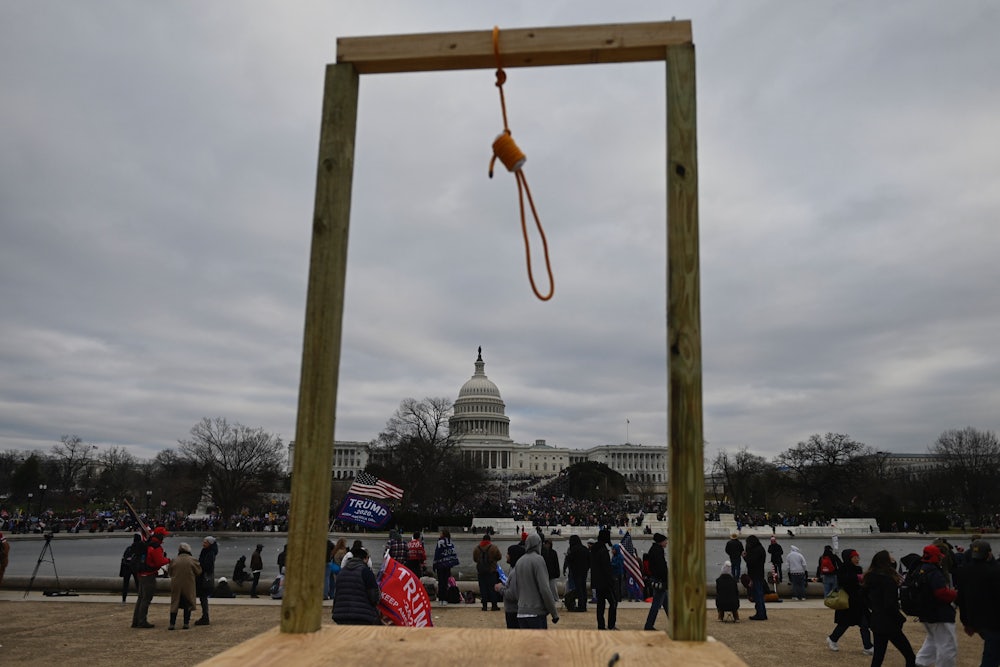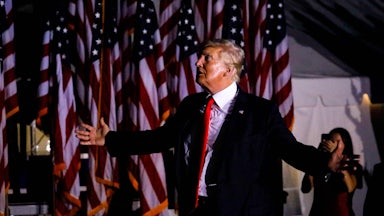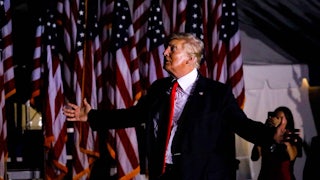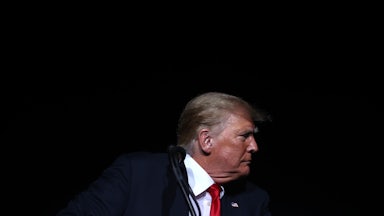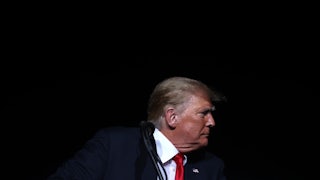It doesn’t take a genius to figure out what Donald Trump is trying to accomplish by filing a lawsuit to prevent documents pertaining to the January 6 insurrection from ending up in the hands of the lawmakers on the commission who are investigating the events of that day. And for once, it’s not just because Trump is famously lacking in subtlety. His lawyers may bluster about a “vexatious, illegal fishing expedition” that is “untethered from any legitimate legislative purpose,” but his case is weak. Trump is simply hoping that, by gumming up the works, he can eat enough clock and delay the release of these documents until after 2022, when it’s highly likely that Republicans will retake the House of Representatives and put the kibosh on any further inquiry.
Trump is an expert in few things, but he is extraordinarily adept at wasting time, at least when it comes to legal matters. He is also the progenitor of a shocking number of shamelessly frivolous lawsuits, the better to manipulate the legal system into serving his short-term interest. He successfully managed to block the release of his tax returns for years. Now he hopes to prevent the January 6 commission from gaining access to potentially damning information about what exactly he was doing as rioters stormed the Capitol.
Trump’s legal case offers little in terms of substance. As the constitutional law scholar Aziz Huq wrote in Politico, the Supreme Court “recognized the limited scope of former presidents’ constitutional interest in their confidential papers” in 1977, when Richard Nixon attempted to block the release of his papers and tape recordings. The court found then that the current occupant of the Oval Office is the best person to assert what does and does not deserve executive privilege. In this instance, Joe Biden has made it very clear: These papers should be released.
The law, moreover, is clear: Biden, not Trump, oversees the decision as to which documents are and are not “privileged.” As Huq notes, “A 2009 executive order, which Trump never changed, plainly puts the Oval Office incumbent in charge of disclosure decisions (and denies former president[s] any right to sue).”
What’s happening right now, as recalcitrant witnesses like Steve Bannon defy subpoenas in a collective effort among Trump allies to sandbag the commission, should be instructive for the Biden administration. Congress is attempting to compel figures connected to the January 6 insurrection to testify about their role; Bannon has thus far refused, citing executive privilege—a ridiculous assertion, given the fact that he left the White House more than four years ago.
Democrats have huffed and puffed and threatened him with contempt, but thus far the tactic is working. Bannon can use bad-faith legal arguments to keep the January 6 committee at bay, knowing that the only option at Congress’s disposal is to file suits that will take time to worm their way through the judicial system (and likely encounter Trump-friendly stooges on the bench along the way). This would necessarily stall the commission’s work and delay any substantive investigative findings until after the midterm elections. On the matter of Trump’s documents, the Biden administration will almost certainly prevail eventually, but “eventually” isn’t good enough. Democrats simply can’t afford to twiddle their thumbs for the next 14 months if they want the commission to accomplish anything meaningful beyond providing yet another example of how lawless Trump and his inner circle can be.
The clearest, simplest thing for the White House to do is to release the documents into the public custody, either by simply disclosing them or, failing that, ensuring that they find their way into the hands of the media. Biden can do so citing the broad authority he is granted under Article II—Trump, for what it’s worth, released several caches of previously classified information this way. (If Biden wants to do it old school, he could dispatch an aide to meet me in a parking garage somewhere, I’m not picky.) The point is, once the documents find their way into the public’s custody, all the arguments pertaining to executive privilege are moot.
These are vital documents, and there’s no sound legal or political argument for keeping them hidden away as they relate to the actions a sitting president took to undermine democracy. Making them public, as Crooked Media’s Brian Beutler noted on Twitter, serves two purposes: It prevents a Trump-appointed judge from stepping in and delaying things even further, and it avoids the gymnastics needed to make them public once they’re released by Congress—that is, it would prevent them from having to be read into the congressional record. (“Just put them on the internet and it’s over,” writes Beutler.)
If we are to take the January 6 commission and the president at their word, then these documents are of vital interest to the public. Trump is attempting to play legal games to stop them from ever seeing the light of day. The best path forward is the clearest, simplest one. Don’t let them get caught up in an endless court battle. Just make them public, already. Yes, it will touch off a barbaric howl of protest from Trump and his legal team; the cable news pundits will treat it as some kind of gauche escalation. But sometimes it’s better to ask forgiveness than permission.
